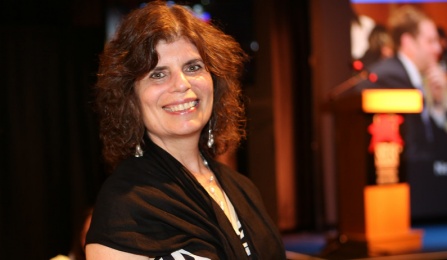Advocating for victims of intimate partner violence

“Part of what we teach is resilience and the danger of secondary trauma, and learn how to manage it.” – Judith Olin ’85
Stemming the tide of violence that happens in families – partners hurting each other or their children – takes a team effort.
Advocates increasingly have adopted a multidisciplinary approach to helping victims of such violence, says Judith Olin ’85. It’s a model she has guided as director of the Lee Gross Anthone Child Advocacy Center, a one-stop facility in Buffalo where alleged victims of child abuse can interact with police, prosecutors, child protection advocates and therapists, all in a family-friendly environment.
As Olin leaves that organization to head one of UB Law’s oldest and best known legal clinics, the Family Violence and Women’s Rights Clinic, she brings with her the knowledge that Buffalo and Erie County are troubled by high rates of family violence – but also the conviction that highly committed students can make a difference.
“Students will have a unique opportunity to engage in advocacy on behalf of victims of intimate partner violence in court and through community outreach and education projects,” she says. “They will also have the opportunity to gain firsthand knowledge about the multidisciplinary team approach to child abuse cases, and to work with experts and learn about legislative reform in family violence.”
Students in the clinic, Olin says, will observe as cases of suspected child abuse are investigated, to gain a fuller understanding of how investigators and advocates work together. They’ll also be able to represent adult victims of intimate partner violence, for example in seeking an order of protection in Family Court.
Olin also points to longstanding local coalitions that work against family violence, saying, “I envision the students working with coalitions like that to learn about their work and to offer some legal education to them as well. “I’ve always been interested in the intersection of law and social problems like domestic violence and child abuse,” says Olin, whose undergraduate work was in philosophy at New York University. “It’s just always been naturally a very compelling area.”
She has followed those interests into a series of positions, including serving as a staff attorney in Neighborhood Legal Services’ Family Law Unit; supervising students in the Child Advocacy Law Clinic at the University of Michigan Law School; as an assistant Erie County district attorney; and at the Child Advocacy Center, where she spent 12 years. She also taught a course in Child Abuse and Neglect at UB Law for six years. That class was notable for her use of UB theater students to role-play child abuse victims so law students could practice interviewing children in a developmentally appropriate way.
Law students who are drawn to learning about this area of the law, Olin says, tend to be highly committed. “These are students who are very, very passionate about these issues and committed to working on them,” she says. “This is just what they want to do.”
But the work comes with hazards for the practitioner. “When you work with victims like this, it’s very challenging,” says Olin, whose appointment came as the result of a national search. “Victims who experience violence deal with a lot of emotional issues, and these pose challenges for an attorney who is interested in working with them.
“Part of what we teach is resilience so that students can recognize the danger of secondary trauma, and learn how to manage it. It’s really important that students who work with family violence victims give themselves the opportunity to process that trauma with their teacher and with each other. Some may benefit from the practice of mindfulness meditation. Others may release stress through exercise. But they need to have something so that they can remain effective advocates.”